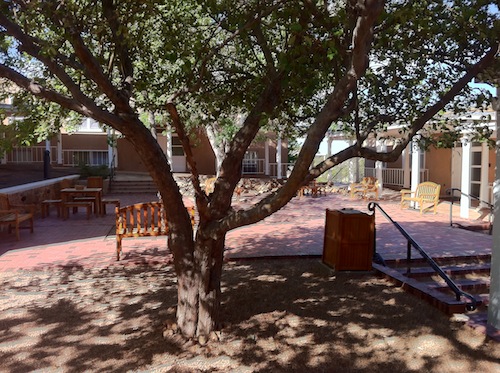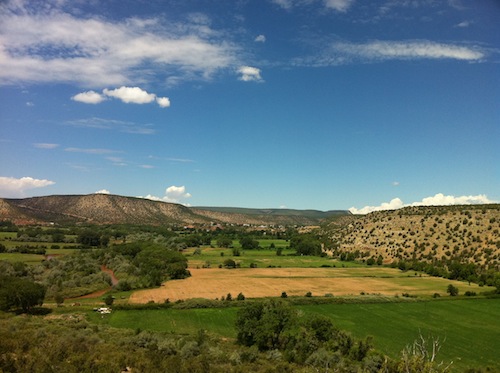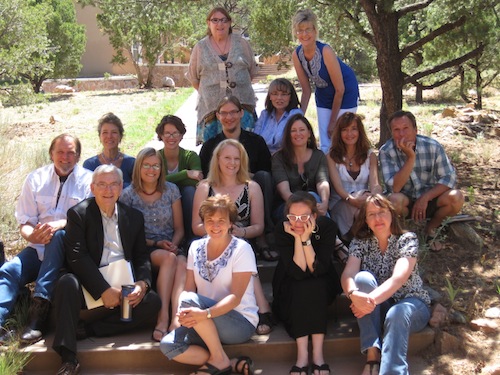My attempt to put into words what I love about IMAGE journal’s Glen Workshop, prompted by an invitation from Glen Director Anna Johnson to contribute a video testimony explaining my decision to return to Glen West for the second year in a row, quickly turned up this picture: I go to the Glen for the same reasons I go to the symphony.
I live in Nashville, TN, Music City, USA, home to a great symphony with a great concert hall. Nearly every time the symphony plays — every other week during their regular season, repeating the concert on Thursday, Friday, and Saturday — I can be found at the dress rehearsal (following along with score in hand) and at least one of the concerts (usually more).
To close their 2010/2011 season, the Nashville Symphony performed Gustav Mahler’s 2nd symphony, the “Resurrection Symphony,” a title taken from the text Mahler set for the chorus in the final movement. As someone who is convinced that Gustav Mahler is the greatest composer who ever lived, I had looked forward to this concert ever since it was first announced. It did not disappoint. Being able to attend the dress rehearsal and all three performances, sitting in a different part of the hall each night, proved restorative. In his book Through a Screen Darkly, Jeffrey Overstreet quotes a friend of his trying to describe her experience at a Bill Frisell concert (I’m paraphrasing here): “Music is like one of those programs that you run to clean up your hard drive. It heals a million little things you didn’t even know were broken.” The “Resurrection Symphony” certainly does that for me.
In 1915, one critic described the piece this way: “The problems of the hereafter and immortality, for which this work provides such a redeeming and promising answer, are problems with which everyone has wrestled. What is expressed here in tones is the echo of all fear, all hope, and all doubt, which everyone carries about in the depths of his being and which is ever-present.”
The way the piece ends, the fourth movement featuring an alto soloist singing about “the questioning and agonized searching of the soul for God and for its own eternal existence,” as Mahler put it, followed by the choir singing eight stanzas of a hymn about resurrection, the organist waiting until the last stanza to make their first entrance of the evening, all of this after the dread and despair and hopelessness of the previous hour of music, after the repeated occurrence of the “death cry,” a big dissonant B-flat minor over C chord played by the tutti orchestra — that is what kept me going back night after night.
When I leave my house for an evening at the symphony, I do so knowing that the night will be filled with beauty and that an attentive posture will be rewarded, that a careful listening will turn up moments that demand I return the next night, and the next. The way the horns sound at the opening of the 3rd movement. That English horn solo during the adagio. Then the choir entrance, delayed almost to the end of the piece, finds me blinking away tears, the brass chorale that makes me sit up in my seat and pay closer attention, awash in beauty.
 Photo: Stephen Lamb
Photo: Stephen Lamb
I look forward every year now to the Glen Workshop for much the same reason, knowing that it will heal me in ways I didn’t even know I was broken. Knowing that I become more like the person I want to be after a week there. I know that the whole week will serve as a call to pay attention, that we will be offered continual reminders that maybe, just maybe, beauty will save the world. But I also know that there will be moments throughout the week that remind me of the off-stage trumpet entrance in Krzysztof Penderecki’s piano concerto, where the chorale theme is stated in full for the first time, moments that remind me of why I return.
Here’s a litany of some of those moments this year. An encouragement, perchance, for you to join us next year:
The not-uncommon occurrence of a meal stretching into a two-hour conversation, conversations that are about more than each party getting a word in edgewise. The kind of conversations the inimitable Wendell Berry describes in Remembering, one of the novels in his Port William series: “And as they ate, they talked, making themselves known to each other.”
The Over the Rhine concert on Saturday evening, where Linford and Karin managed to encapsulate the week with their last four songs: “All My Favorite People” (Orphaned believers, skeptical dreamers / You’re welcome / Yeah, you’re safe right here / You don’t have to go // All my favorite people are broken); “Undamned,” with Ashley Cleveland taking over Lucinda William’s part (I’ve got a thousand lost songs / I’ve done a thousand things wrong / But I’m not too far gone / To Fall / Headlong / Into the arms that love me); a breathtaking cover of Leonard Cohen’s “Hallelujah;” and finishing up with “Drunkard’s Prayer” (You’re my water / you’re my wine / you’re my whiskey from time to time).
The hike I took with some friends on our free day where, upon arriving at the top of the mountain, the chatter died out, time slipped away, and we sat in silence for maybe five, maybe fifteen minutes, no one needing to explain the silence, bringing to mind Frederick Buechner’s words on why we are so often afraid of silence:
“The way this world works, people are very apt to use the words they speak not so much as a way of revealing but, rather, as a way of concealing who they really are and what they really think, and that is why more than a few moments of silence with people we do not know well are apt to make us so tense and uneasy. Stripped of our verbal camouflage, we feel unarmed against the world and vulnerable, so we start babbling about anything just to keep the silence at bay. But if we can bear to let it be, silence, of course, can be communion at a very deep level indeed.”
 Photo: Stephen Lamb
Photo: Stephen Lamb
The Glen gathering of the Overstreet-hosted Thomas Parker Society, a night where friends old and new gathered together to share something they had written or simply some writing they love; careful attention and dignity given to each essay, story, poem, and song shared; four hours of “caring for words in a culture of lies,” to cite one book I learned about at last year’s Glen.
Lectures from people like Barry Moser, describing himself as “a reprobate agnostic,” while sounding like anything but. From Lauren Winner, explaining that the reasons she’s a Christian today have almost nothing to do with why she became a Christian fifteen years ago, reading essays from her upcoming memoir Still: Notes on a Mid-Faith Crisis. From Jeffrey Overstreet, encouraging those gathered to play without ceasing, to not lose sight of joy in their creative process.
And I can’t leave out the conversations that continued after each day’s activities were over, often until two or three in the morning, wide-ranging conversations that touched on art and childhood and memories and faith and life, conversations that you don’t want to end but must since you know you should get a couple hours of sleep before things start up again.
There’s another reason I go back to the Glen, a reason best articulated in a poem by Micheal O’Siadhail, a poet whose words I rely on these days to give me space to think, whose poems help me find my own words.
Those We Follow
by Micheal O'Siadhail
The best said little, yet enough to signal praise
the best said least, never laid too heavy a hand;
just a glance of light, a path I might find,
but I followed false signs, stumbled into byways.
At last I retrace, begin the haul again —
the double task that probes the double faith of loss
before gain. And then a patient glow of progress.
I so wanted them to know, to call to them:
Oh, look what I have done! But they have gone
beyond the bend and out of sight. I sway
an instant, peering ahead; a voice resonates:
steady as you go, you carry someone's beacon.
 The Glen West 2011 Memoir class, and teacher Lauren Winner.
The Glen West 2011 Memoir class, and teacher Lauren Winner.
Gathered at the Glen one finds people at different points in their journeys, people in different places in their spiritual wanderings, calling to those ahead and those behind, with permission given to each other to be in the middle of their journey, to be okay with not having all the answers. My friend David Dark, with his book The Sacredness of Questioning Everything, hoped to encourage and cultivate the importance of questioning in community, and I’m grateful to places like the Glen for helping to create a space in which to do just that. (And it’s no accident that I promised several new friends I’d send them a copy of David’s book, continuing conversations we started that week.)
To put it another way: “I find companionship in Buechner's writings,” Philip Yancey wrote in Soul Survivor, “because for me, too, faith is a Pascalian gamble. Though I spend my life in pursuit of God, I often sense that God lies just around the next bend in the trail, just behind the next tree in the forest. I keep walking because I like where the journey has led me thus far, because other paths seem more problematic than my own, and because I yearn for the resolution of the plot. I know a little of life's tragedy. I have tasted of its comedy. I keep walking because I believe in the fairy tale, that a God strong and wise enough to create a world stamped with such beauty and goodness will be faithful in restoring it to the original design. With Buechner, I place a bet on God's firm promise that in the end, all will be well.”
I suspect I’m not alone in finding all around me during that week in Santa Fe people who fill a similar role, people who make me want to believe, people who I think may be able to believe on my behalf on those days when I’m not able to believe.
Another quote from Buechner, one that came up in conversation more than once during the week: “To lose faith is to stop looking. To lose faith is to decide that all you ever saw from afar was your own best dreams.” At the Glen, I find others who think they have seen something more than their own best dreams, others who wrestle with questions of faith and belief in the art they create, in the words they write. And for that, I am grateful. For that, I will continue to return to the Glen, year after year.
Stephen Lamb lives in Nashville, Tennessee, where he works as an arranger, composer, and copyist. When he’s not writing a string arrangement or printing out another thousand pages of music for a studio orchestra or a symphony orchestra somewhere, you can usually find him hanging out at a local coffee shop or pub, book or journal in hand; or playing board games with friends; or smoking his pipe while sharing good conversation over a single malt scotch, a pint of Guinness, or pretty much any kind of coffee or tea. Sometimes he dreams about being a writer. He blogs at Rebelling Against Indifference.















